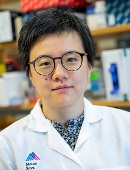Publications:22

Shuang Wang, PhD
About Me
Dr. Wang has a longstanding interest in liver biology and disease. Her major discoveries include an epigenetic crosstalk that controls mammalian liver regeneration (Wang et al. Dev Cell 2019) and an autocrine signaling circuit that emerges in hepatic stellate cells in advanced liver fibrosis (Wang et al. Sci Transl Med 2023). Her current NIH funded research program focuses on epigenetic mechanisms that regulate cell identity and memory in liver. For more info please visit wanglabnyc.com
Language
English
Position
ASSISTANT PROFESSOR | Medicine, Liver Diseases
Multi-Disciplinary Training Areas
Cancer Biology [CAB], Development Regeneration and Stem Cells [DRS]
Education
BSc, University of Toronto
PhD, University of Toronto
PostDoc, Icahn School of Medicine at Mount Sinai
Publications
Selected Publications
- EHBP1 suppresses liver fibrosis in metabolic dysfunction-associated steatohepatitis. Fanglin Ma, Miriam Longo, Marica Meroni, Dipankar Bhattacharya, Erika Paolini, Shama Mughal, Syed Hussain, Sumit Kumar Anand, Neha Gupta, Yiwei Zhu, Amaia Navarro-Corcuera, Kenneth Li, Satya Prakash, Bruno Cogliati, Shuang Wang, Xin Huang, Xiaobo Wang, Arif Yurdagul, Oren Rom, Liheng Wang, Susan K. Fried, Paola Dongiovanni, Scott L. Friedman, Bishuang Cai. Cell Metabolism
- Mannose reduces fructose metabolism and reverses MASH in human liver slices and murine models in vivo. John G. Hong, Joshaya Trotman, Yvette Carbajal, Poulomi Dey, Mariel Glass, Victoria Sclar, Isaac L. Alter, Peng Zhang, Liheng Wang, Li Chen, Mathieu Petitjean, Dipankar Bhattacharya, Shuang Wang, Scott L. Friedman, Charles Derossi, Jaime Chu. Hepatology Communications
- Stellate cell-specific adhesion molecule protocadherin 7 regulates sinusoidal contraction. James K. Carter, Ming Chao Tsai, Nicholas Venturini, Jiangting Hu, John J. Lemasters, Miguel Torres Martin, Daniela Sia, Shuang Wang, Youngmin A. Lee, Scott L. Friedman. Hepatology